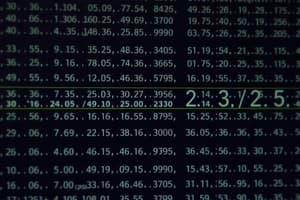Podcast
Questions and Answers
Qu'est-ce qu'un algorithme?
Qu'est-ce qu'un algorithme?
- Un ensemble de données
- Un ensemble d'instructions pour résoudre un problème spécifique (correct)
- Une structure de données
- Un programme informatique
Quel type d'algorithme est utilisé pour analyser et opérer sur les structures de données de graphes?
Quel type d'algorithme est utilisé pour analyser et opérer sur les structures de données de graphes?
- Algorithme de graph (correct)
- Algorithme de machine learning
- Algorithme de tri
- Algorithme de recherche
Quel algorithme est utilisé pour ranger des données dans un ordre spécifique?
Quel algorithme est utilisé pour ranger des données dans un ordre spécifique?
- QuickSort (correct)
- PageRank
- Dijkstra's algorithm
- Hashing algorithm
À quoi servent les algorithmes de machine learning?
À quoi servent les algorithmes de machine learning?
Quelle est la fonction principale des algorithmes de recherche?
Quelle est la fonction principale des algorithmes de recherche?
Quel algorithme est utilisé pour attribuer des valeurs uniques à chaque donnée en vue d'une recherche plus rapide?
Quel algorithme est utilisé pour attribuer des valeurs uniques à chaque donnée en vue d'une recherche plus rapide?
Quel est l'avantage des algorithmes en termes d'automatisation des tâches?
Quel est l'avantage des algorithmes en termes d'automatisation des tâches?
Quelle est l'utilité de l'algorithme de PageRank de Google?
Quelle est l'utilité de l'algorithme de PageRank de Google?
Quel est le rôle de l'algorithme de régression linéaire en apprentissage automatique?
Quel est le rôle de l'algorithme de régression linéaire en apprentissage automatique?
Quelle fonction remplit l'algorithme Quicksort?
Quelle fonction remplit l'algorithme Quicksort?
Pourquoi les algorithmes sont-ils essentiels dans diverses industries?
Pourquoi les algorithmes sont-ils essentiels dans diverses industries?
Que permettent aux algorithmes d'optimiser?
Que permettent aux algorithmes d'optimiser?
Flashcards are hidden until you start studying
Study Notes
Algorithms
Algorithms are a set of instructions designed to solve a specific problem or perform a particular task. They can be found in various fields, including computer science, mathematics, and engineering. Algorithms are used to analyze and process data, optimize processes, make predictions, and automate tasks. In this article, we will explore the concept of algorithms, their importance, and some of the popular algorithms in use today.
Understanding Algorithms
An algorithm is a well-defined sequence of steps or rules that can be followed to solve a problem or complete a task. They are often used to process and analyze large amounts of data, find patterns, and make predictions. Algorithms can be classified into different categories based on their purpose, such as:
-
Search algorithms: These algorithms are used to search for specific information or data in a large dataset. Examples include Google's PageRank algorithm and the Hashing algorithm.
-
Sorting algorithms: These algorithms are used to arrange data in a specific order, such as alphabetical or numerical. Examples include QuickSort, MergeSort, and BubbleSort.
-
Graph algorithms: These algorithms are used to analyze and operate on graph data structures, such as finding the shortest path between two nodes in a network. Examples include Dijkstra's algorithm and A* algorithm.
-
Machine learning algorithms: These algorithms are used to build predictive models and make decisions based on data. Examples include Linear Regression, Logistic Regression, and Support Vector Machines (SVMs).
Importance of Algorithms
Algorithms are essential in today's world due to their ability to process vast amounts of data and make decisions based on that data. They are used in various industries, including finance, healthcare, and transportation, to improve efficiency, reduce costs, and make better decisions. Some of the key benefits of algorithms include:
-
Automation of tasks: Algorithms can automate repetitive and time-consuming tasks, freeing up human resources for more complex tasks.
-
Data analysis: Algorithms can process large amounts of data quickly and efficiently, allowing for better decision-making and insights.
-
Predictive modeling: Algorithms can analyze historical data to make predictions about future events, such as stock market trends or weather patterns.
-
Optimization: Algorithms can be used to optimize processes and systems, reducing costs and improving efficiency.
Popular Algorithms
There are numerous algorithms in use today, each with its own unique purpose and application. Some of the most popular algorithms include:
-
Google's PageRank algorithm: This algorithm is used by Google to rank websites in its search engine results. It analyzes the links between websites and assigns a score based on the quality and quantity of links.
-
BubbleSort algorithm: This is a simple sorting algorithm that works by repeatedly swapping adjacent elements until the array is sorted.
-
QuickSort algorithm: This is a more efficient sorting algorithm that uses a divide-and-conquer approach to sort an array.
-
Dijkstra's algorithm: This is a graph algorithm used to find the shortest path between two nodes in a network.
-
Linear Regression algorithm: This is a machine learning algorithm used to analyze the relationship between two or more variables.
Conclusion
Algorithms play a crucial role in our daily lives, from searching the web to processing financial transactions. They are essential tools for data analysis, optimization, and automation. As technology continues to evolve, we can expect to see even more advanced algorithms that will further improve our lives and the world around us.
Studying That Suits You
Use AI to generate personalized quizzes and flashcards to suit your learning preferences.



